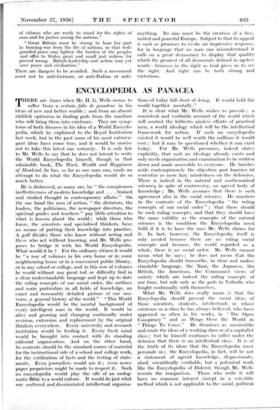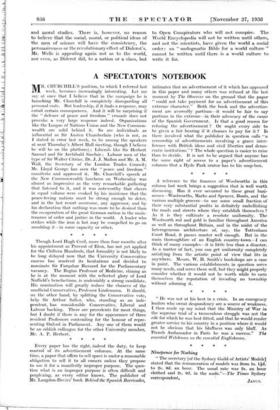ENCYCLOPEDIA AS PANACEA
THERE are times when Mr. H. G. Wells seems to suffer from a certain folie de grandeur in his ideas of new and better worlds ; and from an almost childish. optimism in finding gods from the machine who will bring them into existence. They are symp- toms of both diseases in his idea of a World Encyclo- pedia, which he explained to the Royal Institution last week, but in the past some of his most extrava- gant ideas have come true, and it would be unwise not to take this latest one seriously. It is only fair to Mr. Wells to say that he does not intend to write the World Encyclopedia himself, though in that admirable book, The Work, Wealth and Happiness of Mankind, he has, so far as one man can, made an attempt to do what the Encyclopedia would do so much better.
He is distressed, as many are, by " the conspicuous ineffectiveness of modern knowledge and . . . trained and studied thought in contemporary affairs." On the one hand the men of action, " the dictators, the leaders, the politicians, the newspaper directors, the spiritual guides and teachers " pay little attention to what is known about the world ; while those who know, the scientists and specialised thinkers, have no means of putting their knowledge into practice. A gulf divides those who know without acting and those who act without knowing, and Mr. Wells pro- poses to bridge it with his World Encyclopedia. What would it be ? For the ordinary citizen it would be " a row of volumes in his own home or in some neighbouring house or in a convenient public library, or in any school or college, and in this row of volumes he would without any great toil or difficulty find in a clear understandable language and kept up to date the rilling concepts of our social order, the outlines and main particulars in all fields of knowledge, an exact and reasonably detailed picture of our uni- verse, a general history of the world." "This World Encyclopedia would be the mental background of every intelligent man in the world. It would be alive and growing and changing continually under revision, :extension and replacement by the original thinkers everywhere. Every university and research institution would be feeding it. Every fresh mind would be brought into contact with its standing editorial :organisation. And on the other hand, its contents should be the standard source of material for the instructional side of a school and college work, for the verification of facts and the testing of state- ments. Even journalists would use it ; even news- paper proprietors might be made to respect it. Such an encyclopedia would play. the role. of. an undog- matic Bible to a world culture. It would do just what our scattered and disorientated intellectual organisa- _ tions of today fall short of doing. It would hold the world together mentally."
It is clear what Mr. Wells wishes to provide : a consistent and verifiable account of the world which will control the hitherto aimless efforts of practical men, a world ideology which will be the intellectual framework for action. If such an encyclopedia existed it would be well worth the millions it would cost ; but it may be questioned whether it can exist today. For Mr. Wells presumes, indeed states explicitly, that such an ideology already exists and only needs organisation and examination to be written down and made accessible to everyone. He brushes aside contemptuously the objection quot homines tot sententiae as mere lazy mindedness on the defensive. There is indeed in the natural and mathematical sciences; in spite of controversy, an agreed body of knowledge ; Mr. Wells assumes that there is such agreement also in the social sciences. He numbers in the contents of the Encyclopedia " the ruling concepts of our social order " ; that, there should be such ruling concepts, and that they should have the same validity as the concepts of the natural sciences is the condition the Encyclopedia must fulfil if it is to have the uses Mr. Wells claims for it. In fact, however, the Encyclopedia itself is only needed because there are no ruling social concepts and because, the world regarded as a whole, there is no social order. Mr. Wells cannot mean what he says ; he does not mean that the Encyclopedia should transcribe, in clear and under- standable language, the Nazi, the Japanese, the British, the American, the Communist views of society which are indeed the ruling concepts of our time, but rule only as the gods in Valhalla who fought continually with themselves.
What Mr. Wells does really mean is that the Encyclopedia should present the social ideas of those scientists, students, intellectuals in whose existence as a class he has always believed, who have appeared so often in his works, in " The Open Conspiracy " and as Wings Over the World in " Things To Come." He dismisses as unscientific and crude the ideas of a working class or of a capitalist class ; but he' himself continues to suffer under the delusion that there is an intellectual class. It is of the truth of its ideas that the Encyclopedia must persuade us ; the Encyclopedia, in fact, will be not a statement of agreed knowledge, dispassionate, aloof, scientifically verifiable, but a polemical work like the' Encyclopedia of Diderot, though Mr. Wells resents the compirAon. . Those who write it will have 'rib common interest except in a scientific method -Which is not Eipplicable to the social, political and moral studies. There is, however, no reason to believe that the social, moral, or political ideas of the men of science will have the consistency, the persuasiveness or the revolutionary effect of Diderot's. Mr. Wells is appealing again not as to the world, nor even, as Diderot did, to a nation or a class, but to Open Conspirators who will not conspire. The World Encyclopedia will not be written until others, and not the scientists, have given the world a social order; an " undogmatic Bible for a world culture " cannot be written until there is a world culture to write it for.















































 Previous page
Previous page